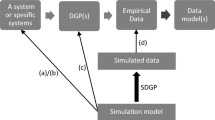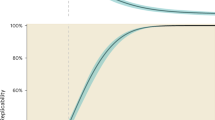Abstract
This chapter reports on an exercise in replicating the analysis of outputs from 20,000 runs of a social simulation of biodiversity incentivisation (FEARLUS-SPOMM) as part of the MIRACLE project. Typically, replication refers to reconstructing the model used to generate the output from the description thereof, but for larger-scale studies, the output analysis itself may be difficult to replicate even when given the original output files. Tools for analysing simulation output data do not facilitate keeping records of what can be a lengthy and complicated process. We provide an outline design for a tool to address this issue, and make some recommendations based on the experience with this exercise.
Access this chapter
Tax calculation will be finalised at checkout
Purchases are for personal use only
Similar content being viewed by others
References
Edmonds, B., Hales, D.: Replication, replication and replication: some hard lessons from model alignment. J Artif Soc Soc Simulat 6(4), 11 (2003). http://jasss.soc.surrey.ac.uk/6/4/11.html
Hales, D., Rouchier, J., Edmonds, B.: Model-to-model analysis. J Artif Soc Soc Simulat 6(4), 5 (2003). http://jasss.soc.surrey.ac.uk/6/4/5.html
Roucher, J., Cioffi-Revilla, C., Polhill, J.G., Takadama, K.: Progress in model-to-model analysis. J. Artif. Soc. Soc. Simulat. 11(2), 8 (2008). http://jasss.soc.surrey.ac.uk/11/2/8.html
Schmolke, A., Thorbek, P., DeAngelis, D.L., Grimm, V.: Ecological models supporting environmental decision making: a strategy for the future. Trends Ecol. Evol. 25(8), 479–486 (2010)
Gimona, A., Polhill, J.G.: Exploring robustness of biodiversity policy with a coupled metacommunity and agent-based model. J. Land Use Sci. 6(2-3), 175–193 (2011)
Polhill, J.G., Gimona, A., Gotts, N.M.: Nonlinearities in biodiversity incentive schemes: A study using an integrated age-based and metacommunity model. Environ. Model. Software 45, 74–91 (2013)
Boero, R., Squazzoni, F.: Does empirical embeddedness matter? Methodological issues on agent-based models for analytical social science. J Artif Soc Soc Simulat 8(4), 6 (2005). http://jasss.soc.surrey.ac.uk/8/4/6.html
Parker, D. C., Barton, NM., Dawson, T., Filatova, T., Jin, X., Lee, J.-S., Polhill, J. G., Robinson, K. and Voinov, A.: The MIRACLE project: a community library to archive and document analysis methods for output from agent-based models. Association of American Geographers 2015 Annual Meeting, April 21–25, 2015, Chicago, IL (2015)
Hastie, T.J., Tibshirani, R.J.: Generalized Additive Models. Chapman & Hall/CRC, Boca Raton, FL (1990)
Akaike, H.: A new look at the statistical model identification. IEEE Trans. Automat. Contr. 19(6), 716–723 (1974)
Breiman, L., Friedman, K., Olshen, R.A., Stone, C.J.: Classification and Regression Trees. Chapman & Hall/CRC, Boca Raton, FL (1984)
Wolstencroft, K., Haines, R., Fellows, D., Williams, A., Withers, D., Owen, S., Soiland-Reyes, S., Dunlop, I., Nenadic, A., Fisher, P., Bhagat, J., Belhajjame, K., Bacall, F., Hardisty, A., Nieva de la Hidalga, A., Balcazar Vargas, M.P., Sufi, S., Goble, C.: The Taverna workflow suite: designing and executing workflows of Web Services on the desktop, web or in the cloud. Nucleic Acids Res. 41(W1), W557–W561 (2013)
Moreau, L., Missier, P. (eds.): PROV-DM: The PROV Data Model. W3C Recommendation 30 April 2013. http://www.w3.org/TR/2013/REC-prov-dm-20130430/. (2013)
Ivanyi, M., Bocsi, R., Gulyas, L., Kozma, V., Legendi, R.: The Multi-Agent Simulation Suite. 22nd Conference on Artificial Intelligence (AAAI-07), Vancouver, British Colombia, 22–26 July 2007. (2007)
Acknowledgements
This work was funded by a number of agencies under the Digging into Data Challenge (Third Round) and by the Scottish Government Rural Affairs and the Environment Portfolio Strategic Research Theme 1 (Ecosystem Services). Computing facilities have been provided by Compute Canada and Sharcnet.
Author information
Authors and Affiliations
Corresponding author
Editor information
Editors and Affiliations
Rights and permissions
Copyright information
© 2017 Springer International Publishing AG
About this paper
Cite this paper
Polhill, G., Milazzo, L., Dawson, T., Gimona, A., Parker, D. (2017). Lessons Learned Replicating the Analysis of Outputs from a Social Simulation of Biodiversity Incentivisation. In: Jager, W., Verbrugge, R., Flache, A., de Roo, G., Hoogduin, L., Hemelrijk, C. (eds) Advances in Social Simulation 2015. Advances in Intelligent Systems and Computing, vol 528. Springer, Cham. https://doi.org/10.1007/978-3-319-47253-9_32
Download citation
DOI: https://doi.org/10.1007/978-3-319-47253-9_32
Published:
Publisher Name: Springer, Cham
Print ISBN: 978-3-319-47252-2
Online ISBN: 978-3-319-47253-9
eBook Packages: EngineeringEngineering (R0)




